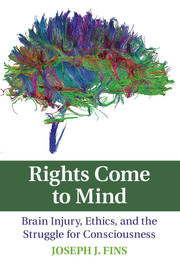Book contents
- Frontmatter
- Dedication
- Epigraph
- Contents
- Miscellaneous Frontmatter
- Acknowledgments
- Introduction
- 1 Decisions
- 2 The Injury
- 3 Coming to Terms with Brain Injury
- 4 The Origins of the Vegetative State
- 5 A Shift since Quinlan
- 6 Maggie's Wishes
- 7 Something Happened in Arkansas
- 8 From PVS to MCS
- 9 Leaving the Hospital
- 10 Heather's Story
- 11 Neuroimaging and Neuroscience in the Public Mind
- 12 Contractures and Contradictions: Medical Necessity and the Injured Brain
- 13 Minds, Monuments, and Moments
- 14 Heads and Hearts, Toil and Tears
- 15 What Do Families Want?
- 16 Deep Brain Stimulation in MCS
- 17 Mending Our Brains, Minding Our Ethics
- 18 It's Still Freedom
- 19 Maggie Is in Town
- 20 When Consciousness Becomes Prosthetic
- 21 The Rights of Mind
- 22 A Call for Advocacy
- Epilogue
- Notes
- In Memoriam
- Index
15 - What Do Families Want?
Published online by Cambridge University Press: 05 September 2015
- Frontmatter
- Dedication
- Epigraph
- Contents
- Miscellaneous Frontmatter
- Acknowledgments
- Introduction
- 1 Decisions
- 2 The Injury
- 3 Coming to Terms with Brain Injury
- 4 The Origins of the Vegetative State
- 5 A Shift since Quinlan
- 6 Maggie's Wishes
- 7 Something Happened in Arkansas
- 8 From PVS to MCS
- 9 Leaving the Hospital
- 10 Heather's Story
- 11 Neuroimaging and Neuroscience in the Public Mind
- 12 Contractures and Contradictions: Medical Necessity and the Injured Brain
- 13 Minds, Monuments, and Moments
- 14 Heads and Hearts, Toil and Tears
- 15 What Do Families Want?
- 16 Deep Brain Stimulation in MCS
- 17 Mending Our Brains, Minding Our Ethics
- 18 It's Still Freedom
- 19 Maggie Is in Town
- 20 When Consciousness Becomes Prosthetic
- 21 The Rights of Mind
- 22 A Call for Advocacy
- Epilogue
- Notes
- In Memoriam
- Index
Summary
This Troubled Middle
Many look at patients with disorders of consciousness and think that it is a fate worse than death. If we had a choice, we would never choose a life like theirs, devoid of mobility, independence, and the ability to communicate a preference. From a distance, we look at these unfortunate ones confident that we could avoid their fate.
It is almost an act of denial, not to imagine the unimaginable because the unforeseen is an outcome that none of these families desired. Instead, the reality they confront is one that emerged, almost accidentally, because of a series of therapeutic goals that were only partially met.
Let me explain. As patients are brought into the emergency wards of hospitals, loved ones are thinking moment to moment and hoping only for survival. Gripped by the suddenness of the tragedy they cannot think ahead to the deeper questions we are confronting now: Is my wife still there? How much of herself does she need to lose before she is no longer herself? And even if she had lost a part of herself, how would I know if she was unable to communicate, blocked as it were, by a lack of motor output from her injured brain?
These later questions are overshadowed by wondering simply about survival. These deeper issues are subsumed by the heroics of acute care: the emergent neurosurgery that prevents or mitigates herniation and the moment to moment vigil hearing the hum of ventilators and watching ICU nurses hanging IV medications. During those early days, patient surrogates are hoping for the best, a full and outright recovery and restoration of the person whose brain injury has fractured a life. And if that is not anticipated, then decisions are made to withhold or withdraw life-sustaining therapies. It is as if there is no middle ground.
- Type
- Chapter
- Information
- Rights Come to MindBrain Injury, Ethics, and the Struggle for Consciousness, pp. 196 - 203Publisher: Cambridge University PressPrint publication year: 2015



